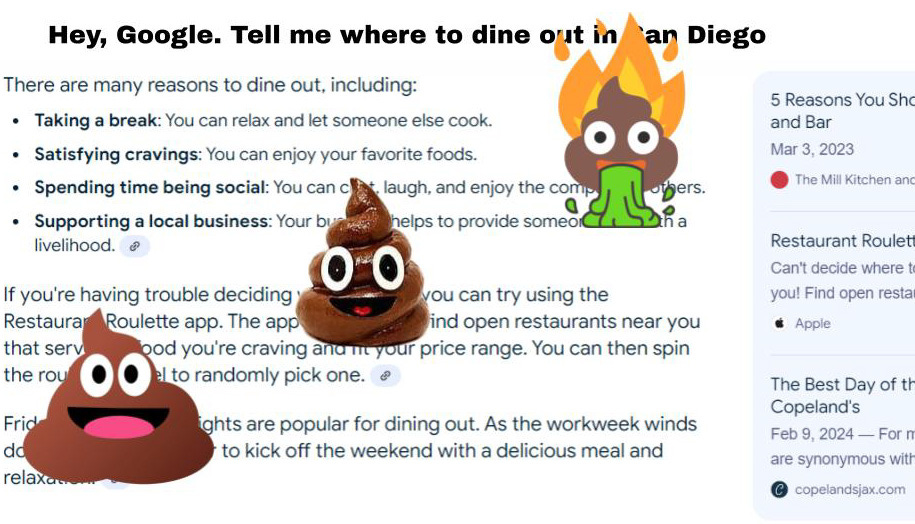For those of you who might not know my work, I’ve been writing a five-days-a-week column since June, 2012. I’ve travelled across several platforms, starting with San Diego Free Press, a self-managed site at WordPress, and now Substack, which has an archive of 1,971 of my works.
I have an unusual sense of humor, a distrust of politicians generally, and try to stay grounded in reality as I view the world through a progressive/lefty lens.
These days it seems as though It takes forever to compose my daily columns. I would estimate that it takes about 90 minutes longer (from the time I type my first take on a lede) than it did two years ago.
This bothers me to no end. Like many people in the final decades of their existence, I worry about the deterioration of my cognitive abilities. I had the surgery for cataracts, which made reading easier.
I definitely see better and am less prone to transpose or misread words when I’m speed reading, but the struggle to get satisfactory prose from Google Drive to Substack’s draft page hasn’t lessened significantly.
I don’t have to worry about remembering names, a stereotyped sign of decline, I’ve always been terrible at it. I routinely search for the correct spelling on nouns, no matter how often I’ve typed them before. The horror of misspelling Mayors Sanders or Faulconer haunts me every day. I’m far from perfect, but I try every day to do my best.
Being unable to post a narrative of sorts to make a point scares the heck out of me. If I want to assert that Carl DeMaio is a scammy politician, I owe readers a context and examples to make my point.
Unfortunately, I rely on Google, both to fact check myself and discover the sources for information being presented. We’re in the age of enshittification, where the quality of products or services are largely irrelevant in relation to the cash flow they provide. It’s like we’ve gone backwards to AltaVista or Yahoo search.
I made the mistake of using Google/Alphabet’s ubiquitous search engine looking for restaurants while in Minneapolis a few months back. As it turned out, many of the choices presented weren’t “near me”; nor were the eateries that I ended up discovering on a walk-about. (The Laotian food was terrific, BTW)
Now we can add Artificial Intelligence to that mix. So many investors have bought into oversold presentations that companies feel obligated to use whatever iteration of a product promises vague visions of efficiency in a specified field. So far, we know AI can perform at the level of about a third grader (stories of golfer’s junk excluded), the companies involved in the end product are losing money, private equity investors are getting impatient, and it sucks up more energy than its worth. Oh, and it might/maybe destroy humanity if left unfettered.
I have high hopes for AI, I really do. But a car without an engine will only move via external forces, and the Large Language Model used for AI applications has a limited number of filters (things that have been written, heard, or seen via devices) for shaping its output. This input, while occasionally allowing for astonishing accomplishments (playing the game GO is one example), can’t account for subjective factors that influence the thinking processes of its masters.
No machine will ever experience the “warm fuzzies,” or “the blues.” There are no recordings of the goings on in Albert Einstein’s mind; he was much more than the theorems and formulas attributed to him. Stevie Ray Vaughan’s intensity while playing guitar can’t be reduced to 1’s and 0’s.
I’m not saying these specific subjective experiences need to be replicated, and frankly hope that bottled love or despair is never available at Target. But I am saying that subjective sensorial experiences (or some replacement) are necessary for machine intelligence to stand alongside its human creators.
Hopefully some moral parameters like “thou shall not harm fleshy life forms” will be part of that something-something if and when it is achieved. People should be scared that the motivation behind AI development as presently constituted is Return On Investment; not creating another force to advance civilization.
AI is everywhere, and it’s failing at accomplishing much everywhere. Sure, it can tell which widgets it’s told are in stock at Lowes, or direct you to a YouTube video on installing those widgets.
But if you’re the executor of an estate wishing to liquidate or distribute a 401K, no can do. You need to speak to a human, which means getting the right extension, leaving unreturned voicemails, listening to “all operators are busy” for hours on end, and sending emails acknowledged but never acted on.
Getting back to Google, some software is looking over my shoulder while I write. In simpler times it would check my spelling, count the words, etc. Now, misspelled words beyond a third grader’s vocabulary aren’t offered up; I must open another tab and run a search on the word, exposing me to whatever suggested results Google can charge for, and maybe a link to a dictionary.
I’m thinking about getting one of them old fangled word-lookup things for my desk; it might be faster.
Google/Alphabet has just replaced their executive in charge of search, likely because they’re under the regulatory microscope in the US and the EU. As a customer I am thrilled by the prospect of a corporate breakup, and saddened by the realization that it’s highly unlikely the company will return to its “don’t be evil” standard.
If you’re willing to do the work, this consumer research outfit has published an article on finding useful content. It’s too much work for everyday folks, but there are insights that might be helpful in those moments when you get that icky feeling while surfing the web.
https://housefresh.com/finding-helpful-content-in-an-enshittified-google/



